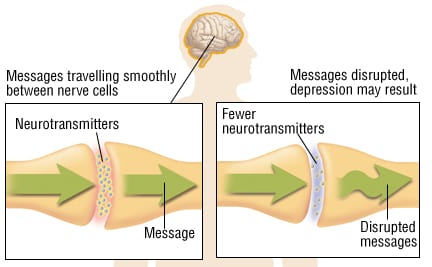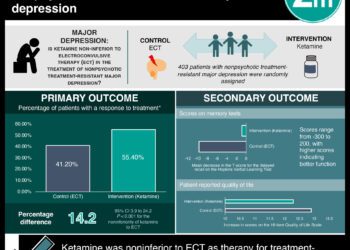Patient Basics: Major Depression
Originally published by Harvard Health.
What Is It?
The most prominent symptom of major depression is a severe and persistent low mood, profound sadness, or a sense of despair. The mood change can sometimes appear as irritability. Or the person suffering major depression may not be able to take pleasure in activities that usually are enjoyable.
Major depression is more than just a passing blue mood, a “bad day” or temporary sadness. The mood changes that occur in major depression are defined as lasting at least two weeks but usually they go on much longer — months or even years.
A variety of symptoms usually accompany the mood change, and the symptoms can vary significantly among different people.
Many people with depression also have anxiety. They may worry more than average about their physical health. They may have excessive conflict in their relationships and may function poorly at work. Sexual functioning may be a problem. People with depression are at more risk for abusing alcohol or other substances.
Depression probably involves changes in the areas of the brain that control mood. Nerve cells may be functioning poorly in certain regions of the brain. Communication between nerve cells or nerve circuits can make it harder for a person to regulate mood. These problems may be affected negatively by hormones. An individual’s life experience affects these biological processes. And genetic makeup influences how vulnerable any of us is to breakdowns in these functions.
An episode of depression can be triggered by a stressful life event. But in many cases, depression does not appear to be related to a specific event.
Major depression may occur just once in a person’s life or may return repeatedly. Some people who have many episodes of major depression also have a background pattern of a milder depressed mood called dysthymia.
Some people who have episodes of major depression also have episodes of relatively high energy or irritability. They may sleep far less than normal, and may dream up grand plans that could never be carried out. The person may develop thinking that is out of step with reality — psychotic symptoms — such as false beliefs (delusions) or false perceptions (hallucinations). The severe form of this is called “mania” or a manic episode. If a person has milder symptoms of mania and does not lose touch with reality, it is called “hypomania” or a hypomanic episode.
If a woman has a major depressive episode within the first two to three months after giving birth to a baby, it is called postpartum depression. Depression that occurs mainly during the winter months is called seasonal affective disorder, or SAD.
Episodes of depression can occur at any age. Depression is diagnosed in women twice as often as in men. People who have a family member with major depression are more likely to develop depression or drinking problems.
Symptoms
A depressed person may gain or lose weight, eat more or less than usual, have difficulty concentrating, and have trouble sleeping or sleep more than usual. He or she may feel tired and have no energy for work or play. Small burdens or obstacles may appear impossible to manage. The person can appear slowed down or agitated and restless. The symptoms can be quite noticeable to others.
A particularly painful symptom of this illness is an unshakable feeling of worthlessness and guilt. The person may feel guilty about a specific life experience or may feel general guilt not related to anything in particular.
If pain and self-criticism become great enough, they can lead to feelings of hopelessness, self-destructive behavior, or thoughts of death and suicide. The vast majority of people who suffer severe depression do not attempt or commit suicide, but they are more likely to do so than people who are not depressed.
The thoughts of people with major depression are often colored by their dark mood. For example, pessimistic ideas may be out of proportion with the reality of the situation. Sometimes, the depressed thinking is distorted enough to be called “psychotic;” that is, the person has great difficulty recognizing reality. Sometimes, depressed people develop delusions (false beliefs) or hallucinations (false perceptions).
Symptoms of major depression include:
- Distinctly depressed or irritable mood
- Loss of interest or pleasure
- Decreased or increased weight or appetite
- Increased or decreased sleep
- Appearing slowed or agitated
- Fatigue and loss of energy
- Feeling worthless or guilty
- Poor concentration or indecisiveness
- Thoughts of death, suicide attempts or plans
Diagnosis
A primary care physician or a mental health professional usually can diagnose depression by asking questions about medical history and symptoms. By definition, major depression is diagnosed when a person has many of the symptoms listed above for at least two weeks.
Many people with depression do not seek evaluation or treatment because of society’s attitudes about depression. The person may feel the depression is his or her fault or may worry about what others will think. Also, the depression itself may distort a person’s ability to recognize the problem. Therefore family members or friends may need to encourage the depression suffer to seek help.
There are no specific tests for depression. However, it is important to be evaluated by a primary care physician to make sure the problems are not being caused by a medical condition or medication.
Expected Duration
On average, untreated episodes last several months. However, episodes of major depression can last any length of time. And symptoms can vary in intensity during an episode.
If depression is not treated, it can become chronic (long-lasting). Treatment can shorten the length and severity of a depressive episode.
Prevention
There is no way to prevent major depression, but detecting it early can diminish symptoms and help to prevent the illness from returning.
Treatment
A combination of psychotherapy and medication is most helpful. The most commonly prescribed antidepressants are known as selective serotonin reuptake inhibitors (SSRIs). They include fluoxetine (Prozac), sertraline (Zoloft), paroxetine (Paxil) and citalopram (Celexa). They are not without problems, but they are fairly easy to take and relatively safe compared with previous generations of antidepressants.
Regarding side effects, SSRIs are known to cause problems with sexual functioning, some nausea, and an increase in anxiety in the early stages of treatment.
Other effective antidepressants are bupropion (Wellbutrin), venlafaxine (Effexor), mirtazapine (Remeron) and duloxetine (Cymbalta). The older classes of antidepressants, tricyclic antidepressants and monoamine oxidase inhibitors, are still in use. They are as effective as the newer ones and can be very useful when someone has not responded well to other treatments.
It usually takes at least two to six weeks of taking any antidepressant to see improvement. Once the right medication is found, it may take up to a few months to find a proper dose and for the full positive effect to be seen.
In the past several years, investigators have raised concerns about an increased risk of suicide in people taking antidepressants. This problem has remained a focus of research, but the evidence remains hard to interpret. Many experts believe that antidepressants reduce the number of suicides overall. But a very small number of people taking these medications probably do have an unusual reaction and end up feeling much worse rather than better.
Although experts continue to debate the research, clinicians agree that it is important to have your treatment monitored closely and for you to report any troubling symptoms or worsening mood to your doctor immediately.
Sometimes, two different antidepressants are prescribed together. Or a mood stabilizer, such as lithium (sold under several brand names) or valproic acid (Depakene, Depakote), is added. If psychotic symptoms are present, an antipsychotic medication is usually prescribed. These include haloperidol (Haldol), risperidone (Risperdal), ziprasidone (Geodon), aripiprazole (Abilify) and olanzapine (Zyprexa, Zydis).
A number of psychotherapy techniques have been demonstrated to be helpful, depending on the causes of the depression, the availability of family and other social support, and personal style and preference. A technique called cognitive behavioral therapy is designed to help a depressed person recognize negative thinking and teaches techniques for controlling symptoms. Psychodynamic, insight-oriented or interpersonal psychotherapy can help depressed people to sort out conflicts in important relationships or explore the history behind symptoms.
If you suffer from depression, you will benefit from educating yourself about the illness. You could also make use of support that may be available in your community.
In some situations, a treatment called electroconvulsive therapy (ECT) can be a life-saving option. This treatment is controversial, but very effective. In ECT, an electrical impulse is applied to the person’s scalp and passes to the brain, causing a seizure. The patient is under anesthesia and is monitored carefully. Medication is given before the procedure to prevent any outward signs of convulsions, which helps to prevent injury. Improvement is seen gradually over a period of days to weeks after the treatment. ECT is the quickest and most effective treatment for the most severe forms of depression, and in most people, it is not more risky than other antidepressant treatments.
When To Call A Professional
Depression is a painful and potentially dangerous illness, so you should contact a health care professional if you have any suspicion that you or a loved one is depressed.
Prognosis
Treatment of depression has become quite sophisticated and effective. The prognosis with treatment is excellent. The intensity of symptoms and the frequency of episodes often are significantly reduced. Many people recover completely.
When treatment is successful, it is important to stay in close touch with your doctor or therapist, because maintenance treatment is often required to prevent depression from returning.
Additional Info
National Institute of Mental Health
Office of Communications
6001 Executive Blvd.
Room 8184, MSC 9663
Bethesda, MD 20892-9663
Phone: 301-443-4513
Toll-Free: 1-866-615-6464
TTY: 301-443-8431
Fax: 301-443-4279
http://www.nimh.nih.gov/
American Psychiatric Association
1000 Wilson Blvd.
Suite 1825
Arlington, VA 22209-3901
Phone: 703-907-7300
Toll-Free: 1-888-357-7924
http://www.healthyminds.org/
American Psychological Association
750 First St., NE
Washington, DC 20002-4242
Phone: 202-336-5510
Toll-Free: 1-800-374-2721
TTY: 202-336-6123
http://www.apa.org/
Depression and Bipolar Support Alliance (DBSA)
730 N. Franklin St.
Suite 501
Chicago, IL 60610-7224
Toll-Free: 1-800-826-3632
Fax: 312-642-7243
http://www.ndmda.org/
National Alliance for the Mentally Ill
Colonial Place Three
2107 Wilson Blvd.
Suite 300
Arlington, VA 22201-3042
Phone: 703-524-7600
Toll-Free: 1-800-950-6264
TTY: 703-516-7227
Fax: 703-524-9094
http://www.nami.org/
National Mental Health Association
2001 N. Beauregard St., 12th Floor
Alexandria, VA 22311
Phone: 703-684-7722
Toll-Free: 1-800-969-6642
TTY: 1-800-433-5959
Fax: 703-684-5968
http://www.nmha.org/




